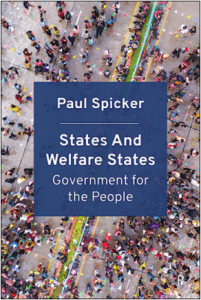 States and welfare states is my twenty-third book. Its main arguments are that:
States and welfare states is my twenty-third book. Its main arguments are that:
- All states provide some welfare; all leave gaps.
- The main methods used in comparative social policy don’t tell us what’s happening.
- The ‘welfare state’ refers to guiding principles, not specific actions.
This leads to some distinctive insights about the subject matter:
- An examination of the sources of legitimacy in modern government, founded in a distinctive understanding of sovereignty and governance;
- An explanation for the burgeoning of social policy initiatives in many states which in the past would not have engaged with it; and
- A new model of the development of greater universality, moving from particularism to solidarity and solidarity to welfare states.
Forty years ago, while being interviewed for a post in a relatively prestigious university, I said that I wanted to work on the theory of social policy. I was told that that didn’t exist as a subject. This is my ninth book set in that non-existent field, and I’m not convinced that people out there are any more persuaded of the relevance of theory now then they were then. One reviewer complained of the ‘high level of abstraction’; two others said it was ‘connected to policy’ and ‘clearly (and always) topical’. Two reviewers thought it was original; one that ‘it will not say anything new to academics in the field’; and one more commented that, rather than being distinctively original, ‘it does draw together a variety of ideas … ‘ Yes, that’s what original theory does. Theory is used to clarify, to structure and to identify the relationships between ideas and evidence. The originality comes from the distinctive synthesis and critical evaluation of material, not from new facts.